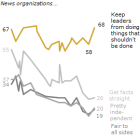Kassim Mohamed (Kenya)
Kassim Mohamed, investigative reporter for Kenya Television Network, believes that investigative journalism is the most important factor to combat and expose corruption behind closed doors.
Investigative Impact (https://impact.gijn.org/2014/10/page/2/)
Kassim Mohamed, investigative reporter for Kenya Television Network, believes that investigative journalism is the most important factor to combat and expose corruption behind closed doors.
Marcelo Moreira, former president of the Brazilian Association of Investigative Journalism, explains why it’s necessary to invest in technology, resources, and legal protection of journalists.
Aung Ye Muang Muang, former executive editor of Myanmar Freedom Daily, says security is the top challenge facing investigative journalists in Myanmar and that protection needs to be improved.
Syed Nazakat, founder of the Centre for Investigative Journalism, India, provides examples of compelling stories in the region and makes the case for better support and resources.
Miranda Patrucic of the Organized Crime and Corruption Reporting Project, discusses the impact of investigative reporting on Eastern Europe and how to improve training for future reporters.
Paul Radu, director of the Organized Crime and Corruption Reporting Project, believes that investigative journalists not only expose wrong-doing but actually prevent crimes from happening.
Rana Sabbagh, executive director of the Arab Reporters for Investigative Journalism, talks about the challenges of training investigative reporters in the Middle East.
Haluk Sahin, professor at Istanbul Bilgi University, speaks about why investigative journalism is more important than ever and the specific dangers faced by reporters in Turkey.

Public evaluations of news organizations’ performance on key measures such as accuracy, fairness and independence remain mired near all-time lows. But there is a bright spot among these otherwise gloomy ratings: broad majorities
continue to say the press acts as a watchdog by preventing political leaders from doing things that should not be done, a view that is as widely held today as at any point over the past three decades. In the wake of revelations about government activities, including the NSA surveillance program and the IRS targeting of political groups, nearly seven-in-ten (68%) say press criticism of political leaders keeps them from doing things that should not be done, while just 21% say press criticism keeps leaders from doing their job. Support for the media’s watchdog role has risen 10 points since 2011 even as other press ratings have shown little sign of improvement. Read more here.
Source: Pew Research

For Upworthy, often the most important data is no data at all. In a Friday talk at the Columbia Journalism School, Daniel Mintz, director of Business Intelligence at Upworthy, explained that in many instances Upworthy does not make raw data about the success of its posts available to its curators. “If the data doesn’t help us make better decisions, that’s not useful data, that clouds judgment,” he said. “We get into fights with staff, ‘don’t take our data away’, we hide that data, because it’s just distracting.” Instead, Upworthy often replaced the data information with terms like “bestish” to offer insight to its curators on the reception of their content, or photos of Mintz with a thumbs-up or thumbs-down.